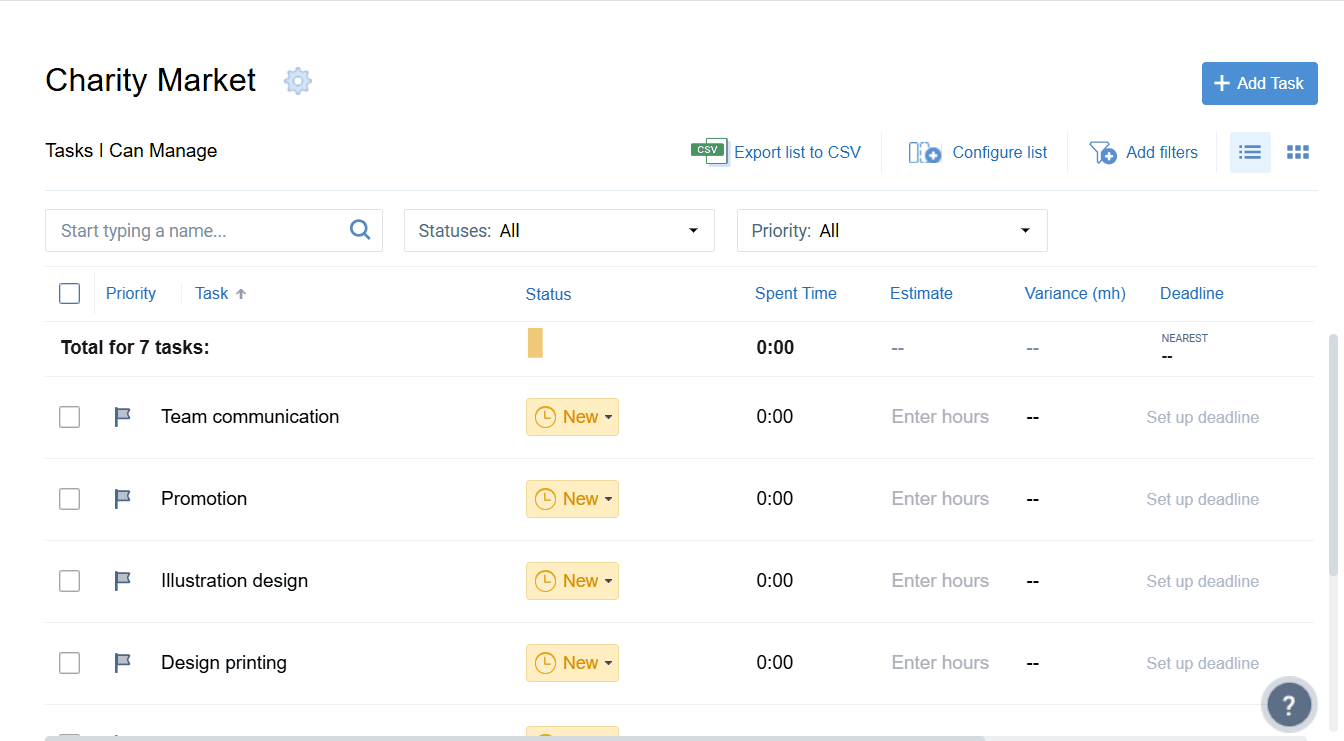
Recruiter services can be expensive. With the average cost of hiring a new employee exceeding $4,000 and the recruitment process often stretching over 42 days, HR professionals are under immense pressure to maximize their time. However, there is surprisingly little practical guidance on how a recruiter can organize their workday and workload to make the most of every minute.
In this blog post, we’ll explore the factors that contribute to time management problems in HR and see how understanding these can lead to better practices and improved productivity.
Summary
The psychology behind poor time management in HR is complex, influenced by various factors such as overwhelm, FOMO, perfectionism, lack of clear goals, and emotional labor.
By understanding and addressing these psychological underpinnings, HR professionals can develop targeted strategies to enhance their time management skills and increase productivity and job satisfaction.
An effective task tracker and our Time Management Certification Course help HR teams achieve these goals at minimal (or no) price and effort.
The Psychology Behind Ineffective Recruiter Time Management
One of the primary reasons for the lack of HR time management advice that goes beyond basics like clever prioritization and work-life balance is the inherent complexity of the role itself.
- HR professionals juggle a vast array of tasks, from recruitment and onboarding to employee relations and compliance. The sheer volume of responsibilities creates a cognitive overload and overwhelm. So, your recruiter may resort to a reactive approach, addressing only what seems most pressing at the moment rather than strategically planning their time.
Psychological insight: The overwhelm is often caused by “decision fatigue,” when the brain’s ability to make decisions deteriorates after a long session of decision-making. The more choices the person faces, the harder it becomes to:
- thoroughly evaluate available options,
- avoid the last-minute rushes,
- understand the expectations and responsibilities.
Solution: Try to categorize tasks by urgency and importance. Divide larger tasks into smaller, manageable steps to make them less daunting.
2. HR professionals often experience FOMO—fear of missing out—on important developments within their organizations or industry. This fear can lead to an incessant need to check emails or stay updated on every minor issue, fragmenting their focus.
Psychological insight: FOMO is driven by social comparison and a desire to remain relevant, as the recruiter constantly feels compelled to respond immediately to every communication. It often results in:
- excessive time spent on emails, calls, and follow-ups, detracting from other essential tasks,
- investing more time than necessary in crafting tailored messages and responses, which can be time-consuming,
- considering a larger pool of candidates than necessary and longer screening processes,
- delays in making offers and waiting for “the perfect candidate” instead of moving forward with qualified individuals already in the pipeline,participation in numerous networking events, webinars, and social media interactions to connect with potential candidates.
Solution: Reduce time spent on social media platforms, consider designated times for checking updates rather than constant engagement..
3. Many HRs are also driven by perfectionism, which prevents them from delegating tasks or completing projects unless they meet their high standards.
Psychological insight: Perfectionism is often rooted in fear—fear of criticism, failure, or not meeting expectations.
- While striving for quality can be beneficial in recruitment, excessive perfectionism can lead to inefficiencies and time management challenges.
- Recruiters may spend excessive time scrutinizing resumes and applications, searching for minor flaws or perfect qualifications, which can delay the screening process.
- The desire to conduct flawless interviews can lead recruiters to overprepare, spending too much time developing questions and reviewing candidate backgrounds instead of focusing on the interaction itself.
- Perfectionists may struggle to make hiring decisions, fearing that they might miss out on the “ideal” candidate. This can lead to delays in extending offers and prolonging the hiring process.
Solution: Acknowledge that perfection is unattainable. Aim for “good enough” instead of perfect, and recognize that mistakes are part of growth. Focus on the progress you make rather than the end result.
4. HR professionals frequently engage in emotional labor—managing their emotions while dealing with sensitive employee issues. This leads to burnout, diminishing their overall effectiveness and capacity for time management.
Psychological insight: The concept of emotional exhaustion highlights how prolonged exposure to stressors can deplete an individual’s mental resources. When emotional labor and burnout intersect, the effects can be compounded, leading to avoidance behavior, inability to set boundaries, and distraction from core tasks.
Solution: Recognize and validate your emotions rather than suppressing them. Make time for activities that rejuvenate you, such as exercise, hobbies, or spending time with loved ones. Prioritizing self-care can help mitigate emotional exhaustion. Don’t hesitate to reach out for support from friends, family, or a mental health professional when feeling overwhelmed by emotional labor.
5. Without clear, defined goals, recruiters may struggle to allocate their time effectively. Ambiguity in objectives can lead to confusion about priorities, resulting in wasted time on tasks that do not align with organizational goals.
Psychological insight: Goal-setting theory suggests that specific and challenging goals lead to higher performance. When HR professionals lack clarity in their objectives, they may feel adrift, unable to focus their efforts on what truly matters. Here’s how this issue manifests:
- Struggling to understand what is expected.
- Spending time on tasks that do not align with the organization’s objectives.
- Reacting to immediate issues rather than proactively working on strategic initiatives.
- Misallocation of time and resources to low-impact activities instead of focusing on high-priority projects that contribute to organizational success.
Solution: Use the SMART criteria (Specific, Measurable, Achievable, Relevant, Time-bound) to define clear and actionable goals. Schedule regular reviews of your goals to assess progress and make adjustments as needed. This keeps you accountable and focused.
A comprehensive reevaluation can help identify gaps in current strategies and create a more efficient framework for managing time.
actiTIME Time Management Certification Course is specifically designed for HR practitioners.
It aims to equip your team with the tools and strategies needed to enhance their time management skills and improve overall efficiency.
Course Highlights:
- Understanding resistance: Learn how to identify the root causes of resistance and develop strategies to mitigate its impact on time management.
- Streamlining processes: Discover methods for creating streamlined workflows that minimize confusion and maximize productivity.
- Balancing short-term and long-term goals: Gain insights into prioritizing tasks effectively, ensuring that immediate concerns do not overshadow strategic planning.
- Practical tools and resources: Access a range of tools and resources designed to improve time management skills in real-world scenarios.
Besides that, actiTIME can help you lighten the load via structured task management, collaboration, and goal setting.
actiTIME Life-Saving Tips for Busy HRs
actiTIME is a time tracking and task management tool that will allow your HR team to categorize and prioritize tasks, enabling them to focus on what’s most urgent and important rather than reacting to immediate pressures.
- Leverage smart task tracking: By breaking big assignments into smaller tasks, setting deadlines, and tracking time spent on each, your staff will be able to focus on one item at a time, reducing feelings of being overwhelmed. The visual representation of tasks and progress will also help in managing workloads more effectively.
- Unify communication: actiTIME supports real-time comment exchange right within the platform; it also integrates with various communication channels and recruiters to manage emails, messages, and updates in one place. This reduces the anxiety that comes from worrying about missing important updates or information and helps your recruiters stay informed about ongoing projects and team activities without feeling the pressure to constantly monitor multiple channels.
- Promote a culture of completion over perfection by allowing users to set realistic goals and deadlines: The focus on task completion rather than flawless execution can help HR professionals let go of perfectionistic tendencies. Additionally, tracking progress can highlight that incremental improvements are valuable.
- Delegate tasks effectively: With respective permissions, in actiTIME you can view your colleagues’ and subordinates’ workload, which helps you easily find someone who will pick up an urgent task that doesn’t fit into the schedule.
- Standardize processes: Create and copy standardized tasks like screening resumes or conducting interviews to maintain quality without excessive scrutiny.
- Maintain emotional well-being: Utilize reminders for upcoming deadlines or task status changes to reduce burnout and stress.

How task setting works in actiTIME
Conclusion
American real estate developer Steve Wynn once remarked, “Human resources isn’t a thing we do. It’s the thing that runs our business.” After all, it’s people who make decisions, develop products, and provide services.
When equipped with the right tools and granted the autonomy to make decisions, HR can emerge as one of the most influential voices within your organization. Utilizing tools like actiTIME and pursuing the right time management practices are excellent ways to create a more supportive and efficient work environment that mitigates feelings of overwhelm, FOMO, perfectionism, lack of direction, and emotional strain.












































![9 Best Contractor Time Tracking Apps for 2026 [Free & Paid]](https://www.actitime.com/wp-content/uploads/2020/10/how-to-find-efficient-contractor.png)



